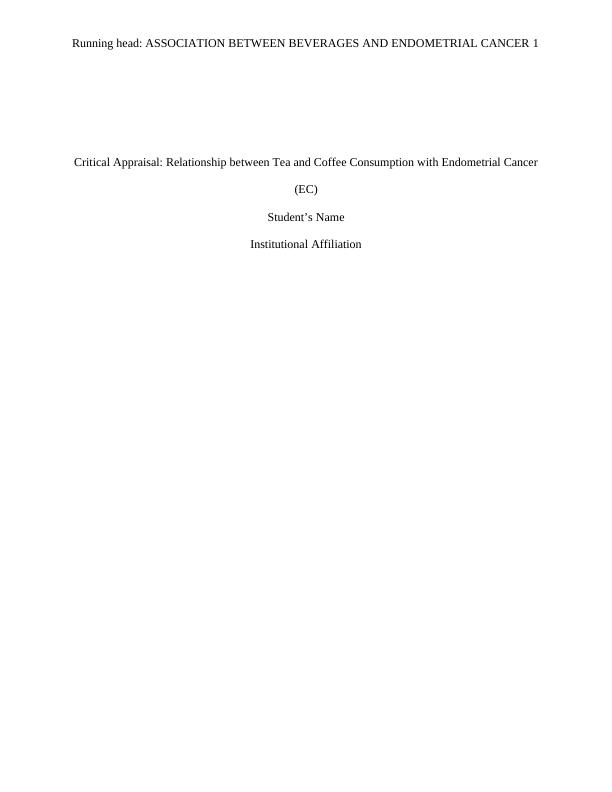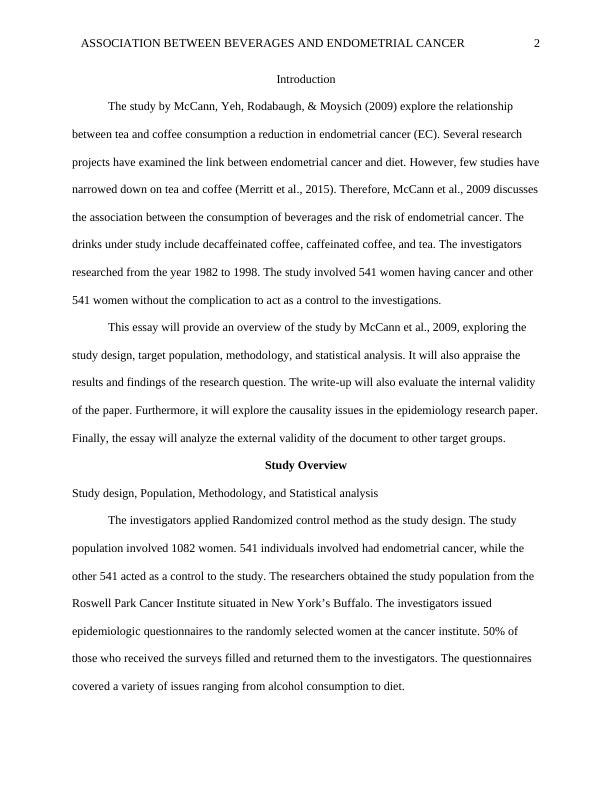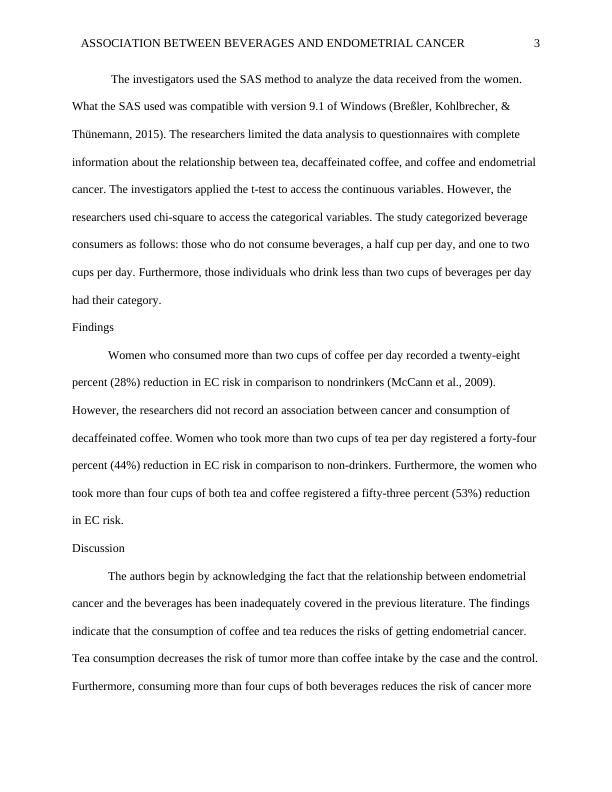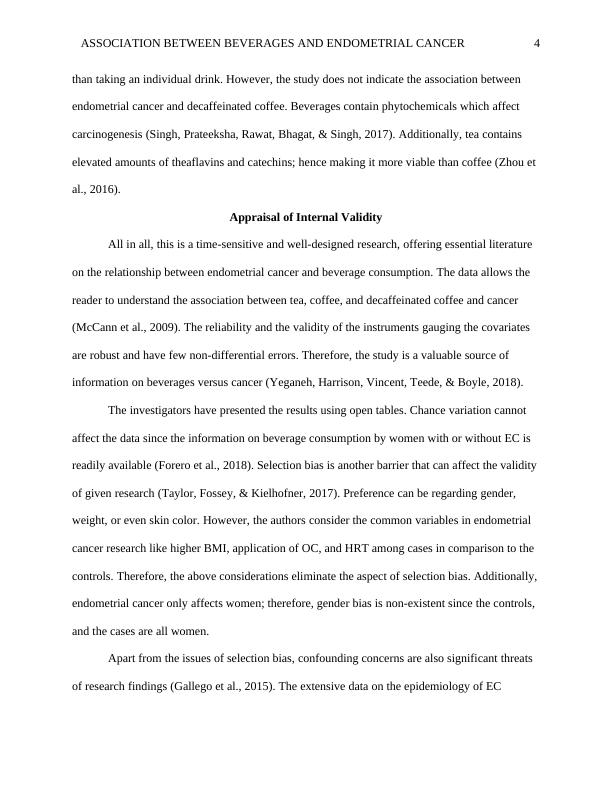Ask a question from expert
Tea and Coffee Consumption with Endometrial Cancer
11 Pages3234 Words84 Views
Added on 2021-09-15
Tea and Coffee Consumption with Endometrial Cancer
Added on 2021-09-15
BookmarkShareRelated Documents
Running head: ASSOCIATION BETWEEN BEVERAGES AND ENDOMETRIAL CANCER 1
Critical Appraisal: Relationship between Tea and Coffee Consumption with Endometrial Cancer
(EC)
Student’s Name
Institutional Affiliation
Critical Appraisal: Relationship between Tea and Coffee Consumption with Endometrial Cancer
(EC)
Student’s Name
Institutional Affiliation

ASSOCIATION BETWEEN BEVERAGES AND ENDOMETRIAL CANCER 2
Introduction
The study by McCann, Yeh, Rodabaugh, & Moysich (2009) explore the relationship
between tea and coffee consumption a reduction in endometrial cancer (EC). Several research
projects have examined the link between endometrial cancer and diet. However, few studies have
narrowed down on tea and coffee (Merritt et al., 2015). Therefore, McCann et al., 2009 discusses
the association between the consumption of beverages and the risk of endometrial cancer. The
drinks under study include decaffeinated coffee, caffeinated coffee, and tea. The investigators
researched from the year 1982 to 1998. The study involved 541 women having cancer and other
541 women without the complication to act as a control to the investigations.
This essay will provide an overview of the study by McCann et al., 2009, exploring the
study design, target population, methodology, and statistical analysis. It will also appraise the
results and findings of the research question. The write-up will also evaluate the internal validity
of the paper. Furthermore, it will explore the causality issues in the epidemiology research paper.
Finally, the essay will analyze the external validity of the document to other target groups.
Study Overview
Study design, Population, Methodology, and Statistical analysis
The investigators applied Randomized control method as the study design. The study
population involved 1082 women. 541 individuals involved had endometrial cancer, while the
other 541 acted as a control to the study. The researchers obtained the study population from the
Roswell Park Cancer Institute situated in New York’s Buffalo. The investigators issued
epidemiologic questionnaires to the randomly selected women at the cancer institute. 50% of
those who received the surveys filled and returned them to the investigators. The questionnaires
covered a variety of issues ranging from alcohol consumption to diet.
Introduction
The study by McCann, Yeh, Rodabaugh, & Moysich (2009) explore the relationship
between tea and coffee consumption a reduction in endometrial cancer (EC). Several research
projects have examined the link between endometrial cancer and diet. However, few studies have
narrowed down on tea and coffee (Merritt et al., 2015). Therefore, McCann et al., 2009 discusses
the association between the consumption of beverages and the risk of endometrial cancer. The
drinks under study include decaffeinated coffee, caffeinated coffee, and tea. The investigators
researched from the year 1982 to 1998. The study involved 541 women having cancer and other
541 women without the complication to act as a control to the investigations.
This essay will provide an overview of the study by McCann et al., 2009, exploring the
study design, target population, methodology, and statistical analysis. It will also appraise the
results and findings of the research question. The write-up will also evaluate the internal validity
of the paper. Furthermore, it will explore the causality issues in the epidemiology research paper.
Finally, the essay will analyze the external validity of the document to other target groups.
Study Overview
Study design, Population, Methodology, and Statistical analysis
The investigators applied Randomized control method as the study design. The study
population involved 1082 women. 541 individuals involved had endometrial cancer, while the
other 541 acted as a control to the study. The researchers obtained the study population from the
Roswell Park Cancer Institute situated in New York’s Buffalo. The investigators issued
epidemiologic questionnaires to the randomly selected women at the cancer institute. 50% of
those who received the surveys filled and returned them to the investigators. The questionnaires
covered a variety of issues ranging from alcohol consumption to diet.

ASSOCIATION BETWEEN BEVERAGES AND ENDOMETRIAL CANCER 3
The investigators used the SAS method to analyze the data received from the women.
What the SAS used was compatible with version 9.1 of Windows (Breßler, Kohlbrecher, &
Thünemann, 2015). The researchers limited the data analysis to questionnaires with complete
information about the relationship between tea, decaffeinated coffee, and coffee and endometrial
cancer. The investigators applied the t-test to access the continuous variables. However, the
researchers used chi-square to access the categorical variables. The study categorized beverage
consumers as follows: those who do not consume beverages, a half cup per day, and one to two
cups per day. Furthermore, those individuals who drink less than two cups of beverages per day
had their category.
Findings
Women who consumed more than two cups of coffee per day recorded a twenty-eight
percent (28%) reduction in EC risk in comparison to nondrinkers (McCann et al., 2009).
However, the researchers did not record an association between cancer and consumption of
decaffeinated coffee. Women who took more than two cups of tea per day registered a forty-four
percent (44%) reduction in EC risk in comparison to non-drinkers. Furthermore, the women who
took more than four cups of both tea and coffee registered a fifty-three percent (53%) reduction
in EC risk.
Discussion
The authors begin by acknowledging the fact that the relationship between endometrial
cancer and the beverages has been inadequately covered in the previous literature. The findings
indicate that the consumption of coffee and tea reduces the risks of getting endometrial cancer.
Tea consumption decreases the risk of tumor more than coffee intake by the case and the control.
Furthermore, consuming more than four cups of both beverages reduces the risk of cancer more
The investigators used the SAS method to analyze the data received from the women.
What the SAS used was compatible with version 9.1 of Windows (Breßler, Kohlbrecher, &
Thünemann, 2015). The researchers limited the data analysis to questionnaires with complete
information about the relationship between tea, decaffeinated coffee, and coffee and endometrial
cancer. The investigators applied the t-test to access the continuous variables. However, the
researchers used chi-square to access the categorical variables. The study categorized beverage
consumers as follows: those who do not consume beverages, a half cup per day, and one to two
cups per day. Furthermore, those individuals who drink less than two cups of beverages per day
had their category.
Findings
Women who consumed more than two cups of coffee per day recorded a twenty-eight
percent (28%) reduction in EC risk in comparison to nondrinkers (McCann et al., 2009).
However, the researchers did not record an association between cancer and consumption of
decaffeinated coffee. Women who took more than two cups of tea per day registered a forty-four
percent (44%) reduction in EC risk in comparison to non-drinkers. Furthermore, the women who
took more than four cups of both tea and coffee registered a fifty-three percent (53%) reduction
in EC risk.
Discussion
The authors begin by acknowledging the fact that the relationship between endometrial
cancer and the beverages has been inadequately covered in the previous literature. The findings
indicate that the consumption of coffee and tea reduces the risks of getting endometrial cancer.
Tea consumption decreases the risk of tumor more than coffee intake by the case and the control.
Furthermore, consuming more than four cups of both beverages reduces the risk of cancer more

ASSOCIATION BETWEEN BEVERAGES AND ENDOMETRIAL CANCER 4
than taking an individual drink. However, the study does not indicate the association between
endometrial cancer and decaffeinated coffee. Beverages contain phytochemicals which affect
carcinogenesis (Singh, Prateeksha, Rawat, Bhagat, & Singh, 2017). Additionally, tea contains
elevated amounts of theaflavins and catechins; hence making it more viable than coffee (Zhou et
al., 2016).
Appraisal of Internal Validity
All in all, this is a time-sensitive and well-designed research, offering essential literature
on the relationship between endometrial cancer and beverage consumption. The data allows the
reader to understand the association between tea, coffee, and decaffeinated coffee and cancer
(McCann et al., 2009). The reliability and the validity of the instruments gauging the covariates
are robust and have few non-differential errors. Therefore, the study is a valuable source of
information on beverages versus cancer (Yeganeh, Harrison, Vincent, Teede, & Boyle, 2018).
The investigators have presented the results using open tables. Chance variation cannot
affect the data since the information on beverage consumption by women with or without EC is
readily available (Forero et al., 2018). Selection bias is another barrier that can affect the validity
of given research (Taylor, Fossey, & Kielhofner, 2017). Preference can be regarding gender,
weight, or even skin color. However, the authors consider the common variables in endometrial
cancer research like higher BMI, application of OC, and HRT among cases in comparison to the
controls. Therefore, the above considerations eliminate the aspect of selection bias. Additionally,
endometrial cancer only affects women; therefore, gender bias is non-existent since the controls,
and the cases are all women.
Apart from the issues of selection bias, confounding concerns are also significant threats
of research findings (Gallego et al., 2015). The extensive data on the epidemiology of EC
than taking an individual drink. However, the study does not indicate the association between
endometrial cancer and decaffeinated coffee. Beverages contain phytochemicals which affect
carcinogenesis (Singh, Prateeksha, Rawat, Bhagat, & Singh, 2017). Additionally, tea contains
elevated amounts of theaflavins and catechins; hence making it more viable than coffee (Zhou et
al., 2016).
Appraisal of Internal Validity
All in all, this is a time-sensitive and well-designed research, offering essential literature
on the relationship between endometrial cancer and beverage consumption. The data allows the
reader to understand the association between tea, coffee, and decaffeinated coffee and cancer
(McCann et al., 2009). The reliability and the validity of the instruments gauging the covariates
are robust and have few non-differential errors. Therefore, the study is a valuable source of
information on beverages versus cancer (Yeganeh, Harrison, Vincent, Teede, & Boyle, 2018).
The investigators have presented the results using open tables. Chance variation cannot
affect the data since the information on beverage consumption by women with or without EC is
readily available (Forero et al., 2018). Selection bias is another barrier that can affect the validity
of given research (Taylor, Fossey, & Kielhofner, 2017). Preference can be regarding gender,
weight, or even skin color. However, the authors consider the common variables in endometrial
cancer research like higher BMI, application of OC, and HRT among cases in comparison to the
controls. Therefore, the above considerations eliminate the aspect of selection bias. Additionally,
endometrial cancer only affects women; therefore, gender bias is non-existent since the controls,
and the cases are all women.
Apart from the issues of selection bias, confounding concerns are also significant threats
of research findings (Gallego et al., 2015). The extensive data on the epidemiology of EC

End of preview
Want to access all the pages? Upload your documents or become a member.
Related Documents
Critical Analysis: Higher Regular Coffee and Tea Consumption is Associated with Reduced Endometrial Cancer Risklg...
|12
|3768
|333
Critical Appraisal of an Article on Higher Regular Coffee and Tea Consumption and Reduced Endometrial Cancer Risklg...
|11
|3463
|422
Epidemiology Assignment 2022lg...
|8
|1929
|33